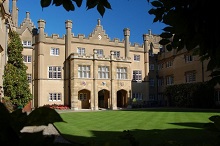
Sidney Sussex College Hall

Sidney Sussex College Plan
|
- "Welcome
to Sidney Sussex," Sidney Sussex College, University
of Cambridge
Sidney Sussex College was founded on St. Valentine's Day in
1596 by legacy of Lady Frances Sidney, Countess of Sussex.
The College is located in the historic heart of Cambridge,
and its beautiful buildings and gardens are home to a
dynamic and diverse academic community. Our students,
Fellows and staff come from all backgrounds and all over the
world, drawn by the University of Cambridge's world-class
reputation and Sidney Sussex's commitment to excellence in
teaching and research.
- Richard Humphreys, "Secret Sidney: A Brief Historical Sketch,"
Sidney Sussex College, University of Cambridge
Sidney Sussex is a very well-kept secret - whether it is our
Nobel Prize-winners, Elizabethan brickwork, charming
Cloister Court, the haunting Chapel, exquisite rococo Hall,
medieval cellars or beautiful ancient gardens - they all lie
behind a rather self-effacing wall of Roman cement. Sidney's
history is an even better kept secret.
There is, however, a truly fascinating and entirely
unexpected history to be told about a small institution
which has always punched way above its weight and which lies
at the heart of British history. Sidney Fellows and students
from 1596 have made a huge impact on all aspects of the
nation's culture, religion, politics, business, legal and
scientific achievements. It has also found time to produce
soldiers, political cartoonists, alchemists, spies,
murderers, ghosts and arsonists as well as media
personalities, film and opera directors, a Premiership
football club chairman, best-selling authors, the man who
introduced soccer to Hungary, the 1928 Grand National winner
and, so they say, Sherlock Holmes. And let's not forget the
University Challenge Champions of Champions, 2002. If you
wanted to study the history of Britain over the last four
hundred years, you could do worse than study the history of
Sidney Sussex College, Cambridge.
|



